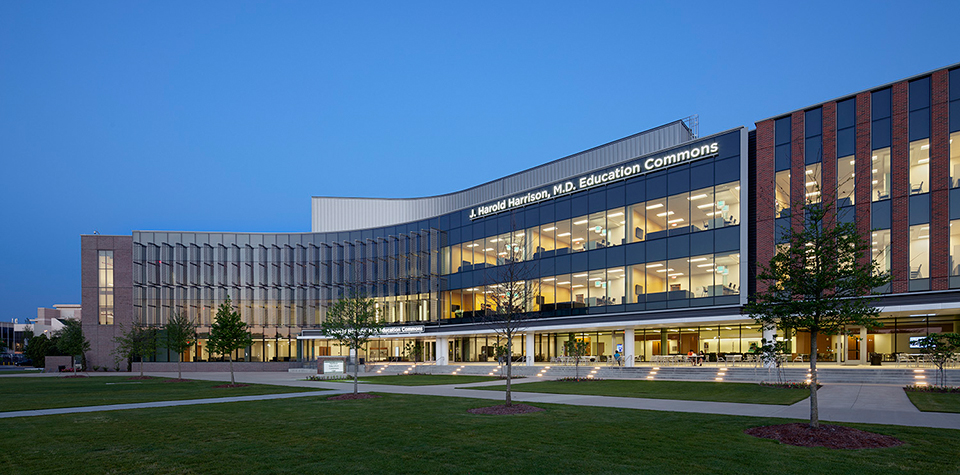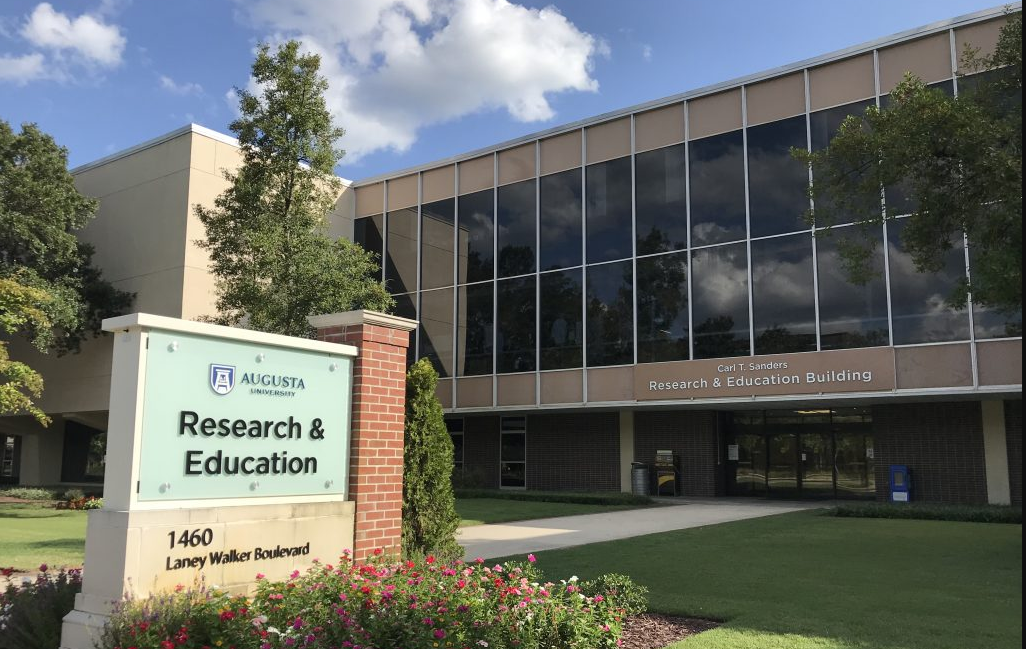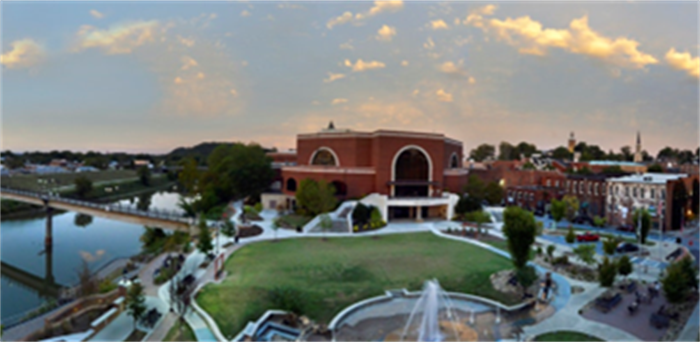Inflamm-Aging Associate/Professor (Tenure-Track), Vascular Biology Center, Medical College of Georgia – Augusta University
- Position:
- Inflamm-Aging Associate/Professor (Tenure-Track), Vascular Biology Center, Medical College of Georgia – Augusta University
- Specialty:
- Leadership, Neuroscience, Bioinformatics, Artificial Intelligence, Nutraceuticals, Vascular Biology, Inflammation – Aging, Genomic Medicine, Biotelemetry, Metabolic Disease
- Location:
- Augusta, GA

Position Overview
The Vascular Biology Center (VBC) of the Medical College of Georgia is seeking applicants with expertise in vascular aging, vascular dementia and vascular contributions to cognitive impairments to fill twelve-month tenure-track faculty positions within Augusta University’s Transdisciplinary Research Initiative in Inflammaging and Brain Aging (TRIBA) initiatve. Desirable applicants will complement the highly-collaborative faculty of the VBC and contribute to the Center’s extramural grant portfolio (currently >$16M) as well as its graduate and post-doctoral training programs.
Minimum Requirements
- PhD or MD/PhD from an accredited college or university
- Excellent communication skills and research interests in vascular biology, aging and inflammation in related conditions (brain, eye, cardiac, pulmonary, obesity/metabolic disease)
- Associate/Full Professors should have established NIH-funded programs
AU – TRIBA
Augusta University (AU) is hiring 15-20 new faculty members for a transdisciplinary research initiative in Healthy Longevity entitled, Transdisciplinary Research cluster in Inflammaging and Brain Aging (TRIBA). The initiative is a cluster recruitment for interdisciplinary faculty positions across AU colleges, including the College of Nursing, to build upon existing AU strengths in Bioinformatics, Artificial Intelligence, Precision Medicine, Personalized Nutraceuticals and Neuroscience to identify potential causes and adverse outcomes of age-related inflammation. Incoming faculty will be associated respectively with the Medical College of Georgia, School of Computer and Cyber Sciences, Dental College of Georgia, College of Allied Health Sciences and the College of Science and Mathematics.
Augusta University, Medical College of Georgia
About the Vascular Biology Center
The Vascular Biology Center presently includes 21 tenured/tenure-track core faculty and their staff (research faculty, Pre- and Post-doctoral Fellows and Research technicians) in well-equipped laboratory space that is over 20,000 square feet. Excellent core facilities exist within the Center including access to Vevo 3100, Seahorse XFEs and metabolic phenotyping cores. Within the institution: small-animal imaging / behavior, biotelemetry, genome editing of mice/rats, next generation and 10x single cell sequencing and advanced imaging (confocal, laser capture, light sheet and electron microscopy).
With the increasing frequency of obesity and diabetes, especially in Georgia, cardiovascular disease is reaching epidemic proportions. The Vascular Biology Center at the Medical College of Georgia at Augusta University knows the demand is high for new and better treatments. Our internationally recognized team of research experts have one goal – to make breakthroughs in the prevention and treatment of disease so that we all may live longer, healthier lives.

Dr. John Catravas founded the Vascular Biology Center (VBC) at Augusta University in 1995. He had a vision of creating a critical mass of accomplished researchers that were focused on a single disease area and one particularly important to Georgia: cardiovascular disease. The strategy was to bring like-minded individuals together in close proximity to stimulate a high level of collaboration. That’s been a very successful strategy so far, resulting in not only multiple PPG grants, but a record number of multiple- investigator R01 grants from the National Institutes of Health (NIH) and the American Heart Association (AHA). We are a campus resource for expertise in metabolic and cardiovascular diseases across campus and for state-of-the-art scientific approaches.
About the Medical College of Georgia at Augusta University
The Medical College of Georgia (MCG) is the flagship medical school of the University System of Georgia, the state’s only public medical school, and one of the top 5 largest medical schools in the United States. Founded nearly 200 years ago in 1828 as the nation’s fifth public medical school, the third medical school in the Southeast and the thirteenth in the nation, MCG has risen to its current role optimizing health care in Georgia and beyond through education, discovery, and service. The Medical College of Georgia educational experience is anchored by the main campus in Augusta, as well as three regional clinical campuses for third-and fourth-year students and a second four-year campus in Athens, Georgia in partnership with the University of Georgia. The state’s medical school also offers clinical training in more than 200 sites across the state providing students experience in the full spectrum of medicine, from tertiary/quaternary care hospitals to small-town solo practices. MCG and its teaching hospitals provide postgraduate education to nearly 500 residents in 44 different programs. More than 51 percent of MCG graduates remain in Georgia to practice, well above the average retention rate of 39 percent. In 2016 MCG graduated more than twice the number of physicians going into primary care and core specialties – like family medicine, internal medicine, pediatrics, obstetrics and gynecology, emergency medicine, and general surgery – than any other medical school in the state of Georgia.
Our researchers and clinicians focus on illnesses that affect most of Georgia and America’s children and adults, including cardiovascular biology and disease, cancer, neurosciences and behavioral sciences, public and preventive health, regenerative and reparative medicine, personalized medicine, and genomics. They also share their expertise with physicians and patients at about 80 clinics and hospitals statewide.
Augusta University Research Institute
Clinical and translational research programs at Augusta University focus on three key areas that disproportionately affect the health of Georgians: cancer, cardiometabolic disease, and neurological disease including stroke. We are also developing three emerging areas of research strength: regenerative & reparative medicine, personalized medicine & genomics, and public and preventive health.
Regenerative and reparative medicine will expand studies of diseases or injuries that impact muscles and skeleton, central nervous system, orofacial, orthopedics, and stroke & neurotrauma. Our cardiovascular, obesity, and diabetes research fights the greatest threats to the western Word. Cancer and genomic medicine research are reducing the burden of cancer through superior clinic care, discovery innovation, translational research, and education. Neurological research is unlocking the mysteries of schizophrenia, stroke, Alzheimer’s disease, Parkinson’s disease, and multiple sclerosis. Personalized medicine is being developed to customize treatments for individual patients, which public and preventive health measures are working to prevent diseases. The Dental College is improving the diagnosis, prevention, and treatment of disease of the orofacial complex, while the Vision Center is engaging in high impact research and discovery related to visual function and disease, the outcome of which is expected to have far-reaching clinical applications for patients suffering from blindness and visual disorders. The multidisciplinary field of Women’s Health is on the cutting edge of research related to the care of women. Our newest area of research will be thorough the very exciting start-up of the Cyber Institute at Augusta University.

Augusta University Health System
Augusta University Health is a world-class health care network, offering the most comprehensive primary, specialty and subspecialty care in the region. Augusta University Health provides skilled, compassionate care to its patients, conducts leading-edge clinical research and fosters the medical education and training of tomorrow’s health care practitioners. Augusta University Health is a not-for-profit corporation that manages the clinical operations associated with Augusta University.
The health system in numbers:
• 478-bed Augusta University Medical Center at Augusta University
• 154-bed Children’s Hospital of Georgia including the region’s only Level IV NICU
• More than 80 outpatient practice sites in one convenient setting (Medical Office Building)
• Critical Care Center, housing a 13-county regional Level I trauma center
In addition to providing care in the Augusta area, Augusta University Health physicians travel to satellite practice sites throughout Georgia illustrating our commitment to care for people across the state and region. Augusta University Health is a thriving academic health center that also is affiliated with the following entities:
Augusta University’s Health Sciences Campus is composed of the:
• Colleges of Allied Health
• College of Dental Medicine
• Graduate Studies
• Nursing
• Medical College of Georgia
Faculty group practice plans, including the:
• AU Medical Associates
• AU Dental Associates
• Allied Health Practice Group
• School of Nursing Faculty Practice Group

Location – Augusta, GA
Georgia’s second-oldest and second-largest city, Augusta, is situated on the southern banks of the storied Savannah River. Serving as a halfway point between the Appalachian Mountains to the north and the Atlantic Ocean to the south, Augusta is a thriving community built on a solid foundation of local pride and artistic eccentricity.
A timeless locale, a visit to Augusta is a life-altering lesson in Southern hospitality. While other places have undergone cultural revolutions, Augusta underwent a cultural evolution instead, trading big city lights and loud, busy streets for cold sweet tea and a shore-side view of the Savannah River. Downtown, locally owned shops and restaurants mingle in the shade of memorable hangouts, and state-of-the-art galleries beckon artists, lovers, thinkers and dreamers alike to the South’s “Garden City.”

Augusta is so much more than just a cozy place to live. Spearheaded by the next generation of musicians, foodies, artists and go-getters, the old city comes to life at night, offering live music, theater shows and a wealth of hole-in-the-wall eateries built to please. In addition to serving as a haven of technology and the arts, Augusta is also home to some of the nation’s most beautiful lakes and trails, offering year-round outdoor adventures.

Sporting life is synonymous with the Augusta name, and the city proper is home to a number of professional baseball, roller derby and rugby teams. Several annual sporting events take place in and around Augusta, including the Ironman 70.3 Augusta triathlon, the Augusta Futurity and the always exciting Augusta Southern Nationals, dubbed by those in the know as the “World’s Richest Drag Boat Race.”
On top of world-class entertainment and outdoor sporting, Augusta is also world-renowned as the home of The Masters—an annual golf tournament sometimes dubbed the “Super Bowl” of golf. Every year during the first full week in April, Augusta becomes the golf capitol of the world, welcoming local legends and long-time favorites back to the prettiest course on Earth.




